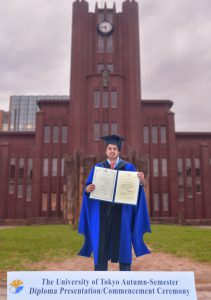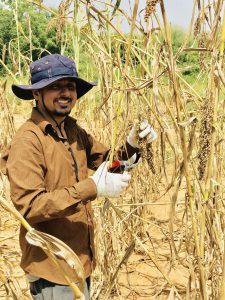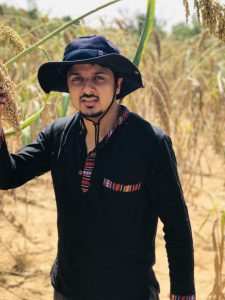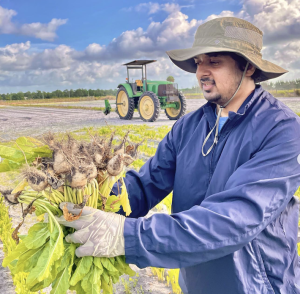
Q: You are pursuing a career in soil and water science—how did you become interested in agriculture?
A: I’m a native of Nepal; our country is vastly agricultural. I am from the district of Dang which is one of Nepal’s most fertile valleys lying between the Mahabharat Range in the north and the Churia range in the south. My family members and ancestors are traditional farmers who used to grow rice, maize, and vegetables. Our family migrated to Dang from Terai, the nation’s breadbasket region.
My family grows mustard, beans, vegetables, and maize—we call corn maize. One of our main crops is cowpeas, a staple food in Nepal. Agriculture has always been a significant part of my life. My late uncle (father’s brother) mostly did agriculture throughout his life, fields where we used to roam as kids. My father also farmed but later studied to become an associate professor at Nepal Sanskrit University in Beljhundi, Nepal. My mother is also a teacher.
Q: Please tell us about your formal education – from grammar school to the completion of your MSc degree.
A: As a youth, I studied at a local school, Shree Pashupati Viddya Ashram, and completed high school at Gorkha International College. When I was a young man, I gradually developed an interest in science. My next step was to earn a bachelor’s degree in agriculture degree at the Institute of Agriculture and Animal Sciences, Tribhuvan University in Nepal. I conducted research on biochar during my undergraduate project, which ignited my interest in the field of soil science.

Then, I left my country to study at the University of Tokyo in Japan. There, my soil science studies were funded with a Japanese Monbukagajusho or MEXT scholarship. My graduate studies were supervised by Dr. Kensuke Okada, a renowned leader in international agricultural development, focusing on soil and water science—of course.
SOILS RESEARCH in WEST AFRICA
As part of my research, I traveled to West Africa. My destination was Kamboinse, Ouagadougou, in the nation Burkina Faso. In Burkina Faso, my study involved sorghum, a crop grown internationally for food—most often processed into flour. My work was concentrated on phosphate rock fertilizer, an essential source of phosphorus for plants. Phosphate rocks are the natural resource from which phosphorous is produced and are Burkina Faso’s major export, mainly transported to Morocco and Egypt, where there are processing factories.


The left-over rocks deemed unsuitable for export can be utilized directly, but their effect is low. As part of my investigations, I evaluated phosphate rock fertilizer prepared by mixing the rock and calcium together as a fertilizer. We found that the calcined phosphate rock fertilizer will be required at the 10kg/ha rate to get a good sorghum yield. From the University of Tokyo, I received a master’s degree in International Agricultural Development with a concentration in soil science in September 2019.
THE VALUE OF SCIENTIST NETWORKING
One of the most valuable aspects of my studies in Japan and Africa is that I made a network of friends across different cultures I continue to communicate with. Students and professors who share the same scientific interests can collaborate and continue to support each other throughout their careers.
Q. Please explain your education at the UF/IFAS Indian River Research and Education Center (IRREC):
A. I started as a Ph.D. student at the University of Florida, Soil and Water Sciences Department, in Spring 2020. At IRREC, my research as a Ph.D. student is under the direction of Dr. Zhenli He at the Soil and Environmental Quality Laboratory, who is a highly experienced scientist in the field. I received a research assistantship for my Ph.D. research to evaluate carbon nanomaterials for agriculture and, more specifically—soil and water quality. My work involves the evaluation of carbon nanomaterials for crop production and implications to plant-soil-environment. It covers the three critical aspects of farming-crop, soil, and the environment.
VEGETABLES AND NANOPARTICLES RESEARCH

The center of my work at the UF/IFAS-IRREC takes place at the IRREC greenhouses and research farm. We grow lettuce in the greenhouse and rotate beets and corn in the field. Beets are cultivated between November to March as the cool-season crop. We recently harvested the beets in late March. After beets, we grow corn as a warm-season vegetable, which we recently sowed in the field. We will study the performance of carbon nanomaterials in plants, soil, and the environment and publish our findings. We will then be able to guide growers on how to manage their farms using carbon nanomaterials.
Q. In about a year and a half, you will complete your doctorate research and coursework and become a Ph.D. soil and water scientist. What are your aspirations for your future as a scientist?
A. I love science and would like to continue research even after my Ph.D. This can be either as a postdoctoral researcher, research assistant, or academic position in a university or research institution. As a researcher trained in soil and water sciences, I am particularly interested in studying the effect of different management practices on crop production and soil biochemical quality. I want to continue to examine the composition of various soils, how it affects plant or crop growth, and how alternative soil treatments affect crop productivity. Also, in the future I would like to do more mechanistic research. Mechanistic research is defined as “trying to understand how things work.” Such research is designed to understand biological processes or the mechanism of action of an intervention. My goal is to develop strategies for optimizing the use of nutrients and understand the mechanisms that drive such changes, which can be meaningful to farmers and scientists around the globe. I want to research and develop methods of conserving and managing soil that farmers can use across the globe.
Q. Jay, what do you ascertain about the future of agriculture on a global level as it pertains to soil and water science?
A. Well, globally, the challenge remains to continue to produce more food while preserving our soil and water resources, which are limited. From the 1960s onward, post the green revolution, we have been able to produce many crops by applying agrochemicals, and extensive irrigation. This pushed the yields higher for a certain time, but our efficiency of production is lower. That is, we now need a lot more inputs to produce the same amount of food as we did before. The rate of productivity increase has declined, particularly since the 1990s
Agriculture systems have mostly plateaued at low yield potential, and agrochemical delivery efficiency is also very low. It is caused by the declining soil quality, which is caused because of a combination of things. The quality of soils has been declining because we are taking a lot from the soils but not replenishing soil nutrients as much as we should. The imminent climate change crisis is going to make things even more complicated. Moving forward, the soil is the only substantial resource we have for producing food. We must learn how to manage our soils better to adapt to climate change. If we manage the soil well, we can sequester carbon and manage CO2 emissions simultaneously. Improving the resource use and efficiency of soil and water will be critical in achieving food security across the globe. We must save our soil and water resources. How we will adapt and learn to manage our soil and water will determine the fate of the food industry, farming, and the entire environment. I expect this to be increasingly more critical in the future.
 26
26
